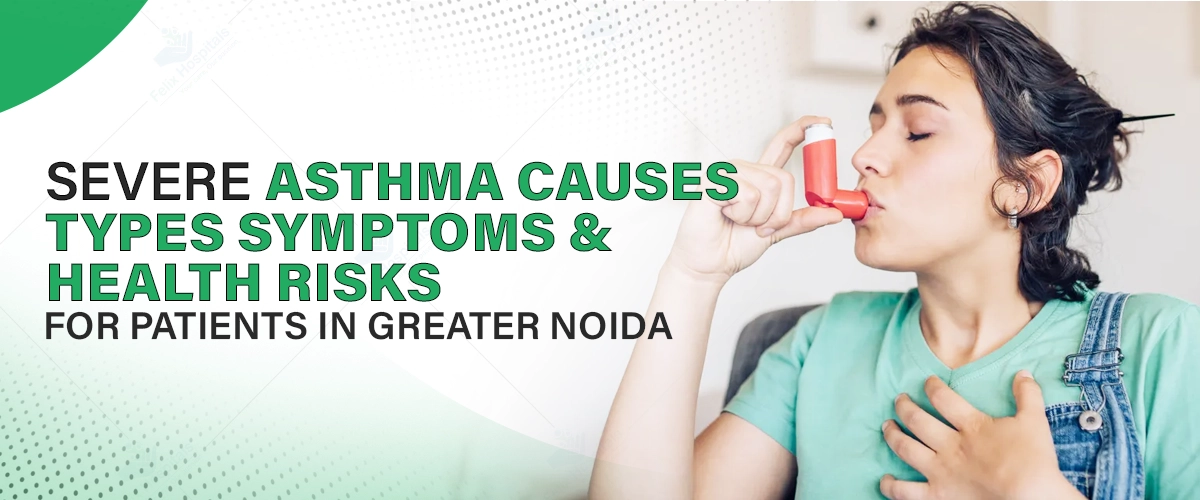
Subscribe to our

Bronchial Asthma or Asthma is an inflammatory disease that affects your lungs. Asthma is a chronic condition and can be treated with appropriate medical management.
Majority of people with asthma can manage their symptoms with medication and avoiding environmental stimuli; however, some have more severe forms that are much harder to manage.
If you have severe or recurrent asthma symptoms and want accurate diagnosis and treatment, consult the best doctor in Greater Noida today.
For personalized asthma treatment from experienced experts in Greater Noida—schedule an appointment today by calling +91 9667064100.
Severe asthma is a type that can't be managed even with intensive therapy. In this type of asthma, symptoms won't improve even on using high doses of inhaled corticosteroids, long-term use of oral steroids, or multiple medications for asthma.
Some people have asthma while others do not. There are certain factors that are responsible for higher risk of asthma.
Triggers are the substances that causes asthma attack if you come in contact with them. Triggers are different for different people but common triggers include:
Symptoms of severe asthma are like those of mild or moderate asthma but much worse and more prolonged. You might feel:
If facing any of these symptoms, call emergency services or visit the best hospital in Greater Noida immediately.
Your healthcare provider will assess your medical history, and will analyse your symptoms. They will need to know about any history of allergies, eczema- a bumpy rash development caused by allergy or any other lung diseases.
Spirometry is a test to measure airflow through your lungs and helps to understand the progress of treatment.
A chest X-ray, blood test, skin test may also be done.
If your asthma does not respond to treatment, it can be termed as treatment-resistant asthma. It may be due to:
The best pulmonologist in Greater Noida will carry out thorough examinations to eliminate these chances before they diagnose a severe case of asthma.
Your treatment will be tailored to the severity and triggers of your condition. Your pulmonologist may prescribe a combination of the medicines including bronchodilators, anti-inflammatory medicines, and biological therapies.
These medications may be adjusted over time, based on how your body responds to treatment.
Preventing severe asthma involves following measures:
Always visit a doctor at best hospital in Greater Noida before using natural remedies, as some will be contrary to prescribed medications.
Yes, some lifestyle changes can really make a difference in controlling asthma. These include:
Although medication is inevitable, some individuals prefer experimenting with natural therapies in combination with the standard treatments.
At the best hospital in Greater Noida, your doctor can create a customized asthma action plan. Share the plan with your family members and caregivers so they know how to assist you in an emergency.
Severe asthma is a tough condition, but it can be well-controlled if you have the correct mixture of medication, lifestyle modification, and emergency readiness. If you or someone close to you in Greater Noida is suffering from asthma symptoms that do not improve with treatment, don't wait. Book an appointment with the best hospital for Asthma treatment in Greater Noida to undergo a complete assessment and initiate a customized treatment program that can have you breathe easy and lead a healthier life.
Q: Which tests can diagnose severe asthma if treatment fails?
Pulmonologists will perform lung function tests like spirometry, FeNO (fractional exhaled nitric oxide), or a methacholine test. They also perform allergy tests, chest X-rays, and blood tests to eliminate other causes.
Q: Do I have severe asthma even if I don't wheeze?
It is not true that only wheezing people have asthma. Chronic cough, breathlessness, or chest tightness can still be features of severe asthma, particularly if they occur despite the use of prescribed inhalers.
Q: How do biologics treat severe asthma?
Biologic drugs act on specific molecules of the process of inflammation. They are typically administered intramuscularly and have the ability to suppress the frequency of asthma attacks, particularly in individuals with allergic or eosinophilic asthma.
Q: Is asthma in Greater Noida exacerbated by pollution or season change?
Yes. Levels of air pollution and sudden fluctuations in the weather in Greater Noida can trigger asthma symptoms. Cold air, dust, pollen, and smog can make your airways more inflamed.
Q: Can stress or emotional distress trigger violent asthma attacks?
Yes. Stress and intense emotions can cause shallow breathing and airway obstruction. Emotional triggers are a key element of a comprehensive asthma care plan.
Q: Are kids with severe asthma treated differently from adults in Greater Noida?
Yes. Pediatric asthma management includes developmentally appropriate inhaler skills, careful monitoring of growth and development, and caregiver education. Treatment is individualized by pediatric pulmonologists according to the child's requirements and includes consideration of school-based asthma action plans.